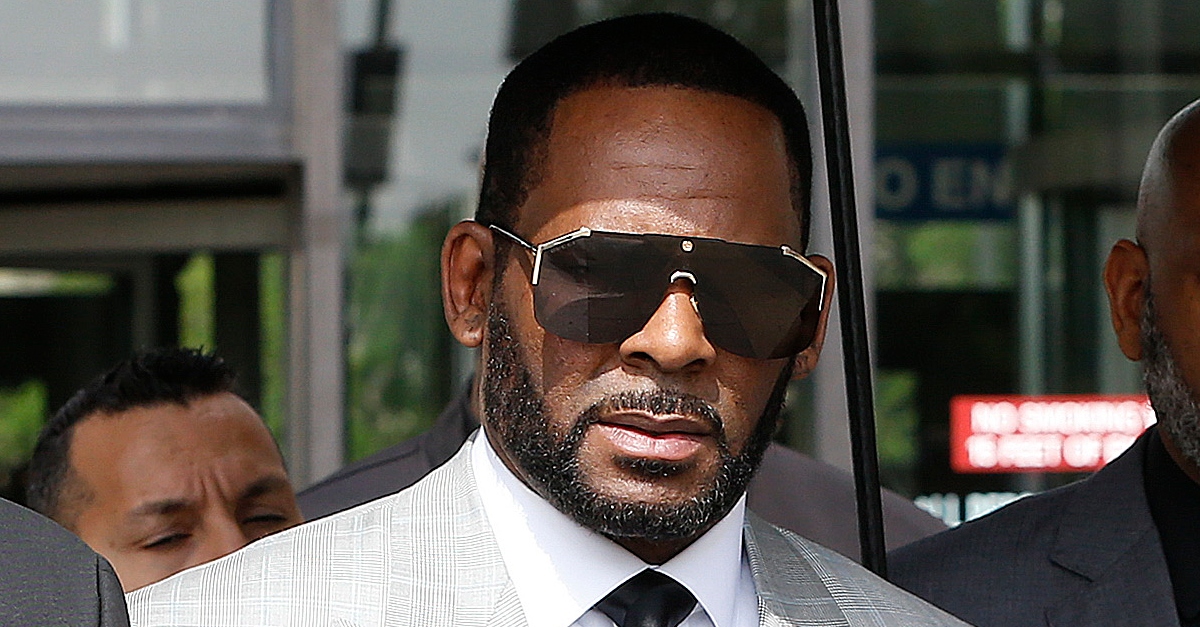
R&B singer R. Kelly leaves the Leighton Criminal Courthouse on June 6, 2019 in Chicago, Illinois. He has faced, and still faces, criminal matters in multiple jurisdictions.
The federal government disputed claims that R. Kelly is being kept on suicide watch as a form of punishment in a court filing the day after the imprisoned superstar’s attorneys filed a lawsuit alleging such treatment.
On July 1, 2022, the singer filed what is known as a Bivens action against Bureau of Prisons regional official Heriberto H. Tellez, the warden of the Metropolitan Detention Center in Brooklyn, N.Y., the federal government, and unknown MDC officials. A Bivens action is the only remedy for suing a federal agent who deprives someone of their constitutional rights. He also sued under the Federal Tort Claims Act, generally claiming that the suicide watch determination was made without him being suicidal and resulted in severe mental distress.
In his eight-page federal lawsuit, Kelly is seeking “compensatory damages for all emotional distress, humiliation, pain and suffering, and other harm in an amount to be determined at trial.” Additionally, he is asking to be taken off of suicide watch immediately.
Additional filings by Kelly’s team outline additional allegations against the New York City prison.
“Mr. Kelly impressed upon me repeatedly that he was not suicidal and the conditions of suicide watch at the MDC were extraordinarily stressful and harmful,” Jennifer Bonjean, the pop star’s attorney, wrote in an accompanying affidavit. “He expressed on multiple occasions that he did not want to be put on suicide watch and that he was not suicidal and had no thoughts of harming himself or anyone else.”
A memorandum of law filed in addition to the lawsuit details the locus of the complaint [emphasis in original]:
Immediately after his sentencing hearing, Mr. Kelly’s counsel spoke with Mr. Kelly and Mr. Kelly again reiterated that he was not experiencing any feelings of hopelessness or any thoughts of hurting himself. Mr. Kelly was behaving in a totally appropriate manner but was concerned that MDC Brooklyn would still place him on suicide watch.
On June 30, 2022, undersigned counsel reached out to the government to determine whether they could be of assistance in determining whether Mr. Kelly was placed on suicide watch. The government kindly assisted and confirmed that he had been placed on suicide watch, stating “We were told that, per the psychology department, he is on a psych alert for various reasons, such as age, crime, publicity, and sentencing. We inquired how long he would be on suicide watch and were told it varies from inmate to inmate so there’s no definite answer.”
“This explanation suggests that the reasons for placing Mr. Kelly on suicide watch have nothing to do with him as an individual or even whether he actually is a suicide risk,” Bonjean’s memo continues. “Simply put, MDC Brooklyn is run like a gulag.”
The government, in a 19-page reply memo, says that Kelly’s lawsuit is much ado about noting.
“[O]n June 29, 2022, U.S. District Judge Ann M. Donnelly sentenced Plaintiff to 30 years in prison,” the filing notes. “That same day, a staff psychologist conducted an in-person assessment of Plaintiff upon his return to MDC. As a result of that clinical assessment, Plaintiff was temporarily placed on suicide watch.”
The U.S. Attorney’s Office for the Eastern District of New York goes on to say the lawsuit’s request for preliminary relief — the request to be removed from suicide watch immediately — should be dismissed for multiple reasons. The chief reason, according to the government, is that Kelly’s lawsuit is likely to fail in the long run.
“Based on the clinical assessment and in accordance with Bureau of Prisons policy for preventing suicides, Plaintiff remains on suicide watch for his own safety,” the government argues. “Plaintiff provides no salient authority that would permit this Court to take the unprecedented step of mandating that BOP remove an inmate from suicide watch.”
(Photo by Nuccio DiNuzzo/Getty Images.)